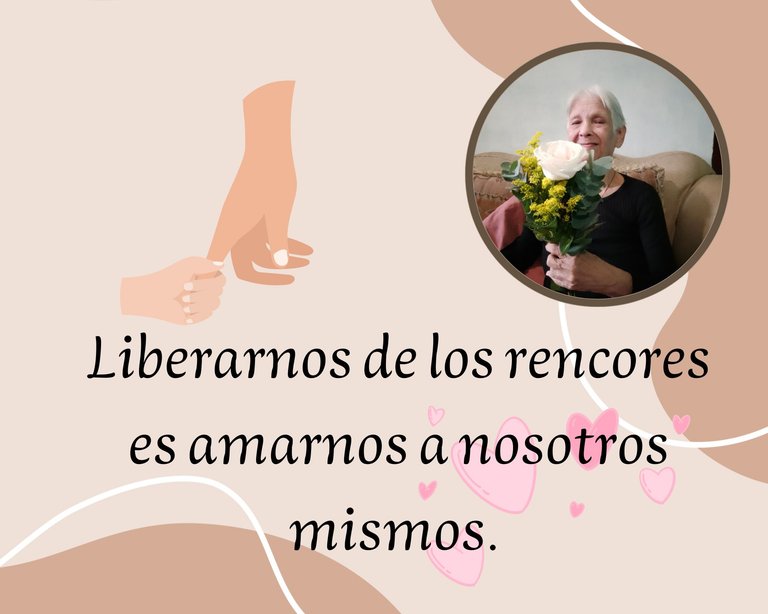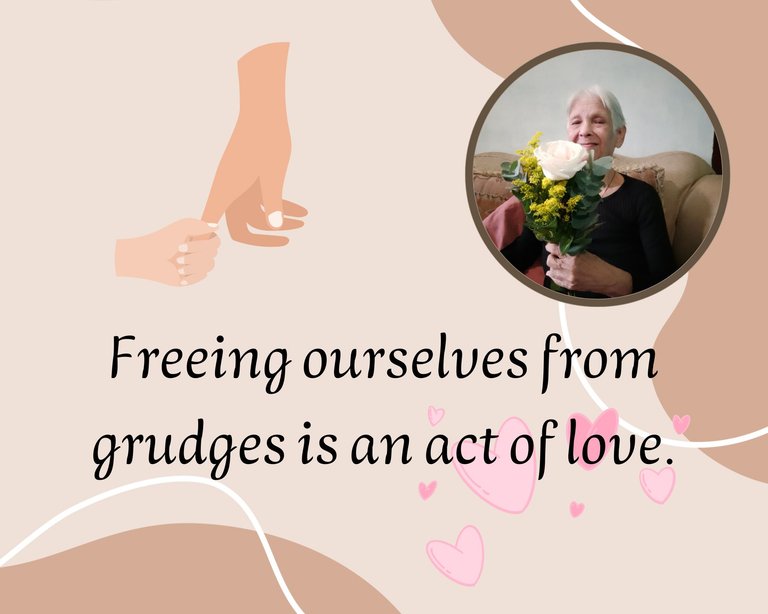
Despues de haber leído la publicación de @minismallholding sobre la importancia del perdón, quise compartir algunas experiencias sobre este tema y tambien las técnicas que me han permitido superar el estres producto de pensamientos y emociones por situaciones del pasado que no se pueden cambiar o por el futuro que no existe
En este momento de mi vida estoy muy consciente de la importancia del perdón para sanar mi alma y a veces mi niño interior, porque muchos de los resentimientos que arrastramos en la vida proviene de experiencias de la niñez.
Suele suceder que guardamos rencor de situaciones que no podemos comprender, y con los años nuestra mente objetiva nos los presenta de otra manera y dejamos de culpar a otros de lo que sentimos en ese momento.
Eso me pasó con mi padre. Yo soy la tercera de seis hijas y sentía que él le prestaba más atención a mis otras hermanas que a mí.
Yo solo veía los momentos en los cuales me llamaba la atención y sobre todo cuando me decía que yo era muy lenta y eso a mí me molestaba mucho. Tanto así que llegué a tenerle rencor por eso. Pero en la medida que fui creciendo y apreciando las cualidades de mi padre, lo amoroso, responsable, juguetón y dedicado a la familia que era, me di cuenta de que esa era su manera de corregir comportamientos que para él no estaban bien, me decia que tenía que estar más pendiente de lo que hacía en vez de estar siempre en las nebulosas, y ese rencor me hacía daño a mí, porque nunca le dije nada a mi padre de lo que sentía y lo reemplace por admiración y amor. Había entendido que esa era su manera de cuidarme y enseñarme.

Pero hay rencores que pueden durar toda la vida y en esas personas el perdón tarda mucho en llegar o nunca llega, dejando una marca de tristeza. Es comprensible que las razones de esto sean situaciones muy duras y difíciles de olvidar que se mantienen en el subconsciente y este lo saca a la luz cada vez que escuchamos o vemos situaciones similares a las vividas. Hay que dejar ir lo que hace daño y el pasado no se puede cambiar, solo aprender de este.
Mi madre, que ya tiene 89 años, vivió gran parte de su vida aferrada a un rencor muy grande contra su madre, producto de situaciones difíciles en su niñez. Si bien lo ocurrido no era fácil de aceptar, y mucho menos por una niña, ella siguió culpando a su madre durante casi toda su vida y aun después de su muerte, sin comprender las circunstancias y el entorno que influyeron en su relación con ella y en un su matrimonio, que le hicieron cometer errores y tomar decisiones quizás llevada por el dolor y la rabia.
Cuando hablaba con mi madre sobre este tema, ella siempre tenía una opinión muy dura mi abuela. Y yo trataba de que pudiera comprenderla de alguna manera y la perdonara y de esa forma se sintiera liberada de esas emociones que no son buenas para el alma. Ella, para cambiar de tema, me decía: es que yo soy muy rencorosa y no voy a cambiar; ella no se lo merece.
Hasta hace poco esa era su actitud, pero un día sentadas las dos en la sala de la casa, en un ambiente tranquilo, aproveché de hablar del tema del perdón y le pregunté.
"¡Mamá! ¿cuando vas a perdonar a mi abuela?"
Se volteó a mirarme y me dijo: "Es que ya yo la perdoné, pero no puedo olvidar lo que viví con mi madre, aunque cada vez los recuerdos son más borrosos"
Me alegré de que la hubiera perdonado porque estoy segura de que eso hizo que sintiera una gran paz.

El estrés, producto de ese sentimiento de rencor y también de culpa por algún error cometido, no es bueno que permanezca en nuestra vida.
Yo he sentido que cuando se puede hablar sobre ese sentimiento con una persona amiga, es como si lo drenara y al escucharnos a nosotros mismos, podemos verlo de otra manera y cambiar ese sentimiento por el de aceptación, si esa persona además nos ayuda, es mayor el efecto.

La escritura es otra técnica muy efectiva, es realmente terapéutica. Esto lo aprendí de un Curso de escritura catártica que hice gracias a esta comunidad.

"Cuando sacamos las emociones de adentro y las ponemos en una hoja, estas se liberan y nuestra mente descansa... he aquí su poder catártico y liberador"
"Todos tenemos algún vidrio roto en el alma que lastima y hace sangrar un poquito, entonces al escribir siento que puedo sacar un poco de esos vidrios fuera de mí. Al ponerlos en un papel ya no me dañan". Eduardo Galeano
Tenemos esa herramienta a la mano, escribamos en un papel lo que sentimos o pensamos y veremos cómo nuestra perspectiva puede cambiar. Lo que parecía que no tendría salida, ni fin, lo dejamos allí y nos liberamos.
En algunos momentos podemos sentir fragilidad, y está bién no siempre tenemos que mostrar fortaleza ante la vida. Cuando esos recuerdos tristes regresen a nuestras vidas, décimos: te perdono y me perdono, pero desde el corazón. Tomamos aliento, varias respiraciones profundas para calmar el cuerpo y la mente, y hay que seguir adelante con alegría, sabiendo que tenemos mucho que agradecer.

Versión en Inglés

After reading @minismallholding's publication on the importance of forgiveness, I wanted to share some experiences on the subject of forgiveness and some techniques that have allowed me to overcome the stress caused by thoughts and emotions that are the result of past situations.
At this moment of my life I am very conscious of the importance of forgiveness to heal our soul and sometimes our inner child, because many of the resentments that we carry in life come from childhood experiences.
It often happens that we hold grudges from situations we cannot understand, and over the years our objective mind presents them to us in a different way and we stop blaming others for what we felt at that moment.
That happened to me with my father. I am the third of six daughters and I felt that he paid more attention to my other sisters than to me.
I only saw the moments when he called my attention to me and especially when he told me that I was too slow and that bothered me a lot. So much so that I came to resent her for it. But as I grew up and appreciated my father's qualities, how loving, responsible, playful and dedicated to the family, I realized that this was his way of correcting behaviors that for him were not right, that I had to be more aware of what I was doing instead of always being in the nebulae, as he told me and that resentment that hurt me, because I never said anything to my father about what I felt, I replaced it with a new one.
because I never said anything to my father about how I felt, I replaced it with admiration and love. I had understood that this was his way of taking care of me.

But there are grudges that can last a lifetime and in those people forgiveness takes a long time to come or never comes at all, leaving a mark of sadness. It is understandable that the reasons for this are very hard and difficult to forget situations that remain in our subconscious and this brings it to light when we hear or see similar situations to those experienced. We have to let go of what hurts and the past cannot be changed, only learned from it.
My mother, who is now 88 years old, lived a large part of her life clinging to a very strong resentment against her mother, as a result of difficult situations in her childhood and what she considered abandonment in her adolescence. Although what happened was not easy to accept, much less for a child, she continued to blame her mother for most of her life and even after her death, without understanding the circumstances and environment that influenced her relationship with her daughter and her marriage and that made her make mistakes and decisions perhaps driven by pain and anger.
When I talked to my mother about this, she always had a very harsh opinion about her mother. And I was trying to get her to understand her in some way and to forgive her and in that way feel liberated from those emotions that are not good for the soul. To change the subject, she would say to me: I am very spiteful and I don't have a lot of regrets. She doesn't deserve it.
Until recently that was her attitude, but one day when we were both sitting in the living room, in a quiet atmosphere, I took the opportunity to talk about forgiveness and asked her: "
"Mom, when are you going to forgive my grandmother?"
She turned to look at me and said: "I have already forgiven her, but I cannot forget what I lived through with my mother, although the memories are becoming more and more blurred"
I was glad that I had forgiven her because I am sure that this made me feel a great peace.
Stress, product of that feeling of resentment and also of guilt for some mistake made, is not good to remain in our lives.
I have felt that when we can talk about that feeling with a friend, it is as if it drains it and when we listen to ourselves, we can see it in another way and change that feeling for one of acceptance, if that person also helps us, the effect is greater.

Writing is another very effective technique, it is really therapeutic. I learned this from a cathartic writing course I did thanks to this community
"When we take out the emotions from inside and put them on a sheet of paper, they are released and our mind rests... here is its cathartic and liberating power"
"We all have some broken glass in our soul that hurts and makes us bleed a little bit, so by writing I feel that I can take a little of that glass out of me. By putting them on paper they no longer hurt me". Eduardo Galeano
We have this tool at hand, let's write on a piece of paper what we feel or think and we will see how our perspective can change. What seemed that there would be no way out, no end, we leave them there and free the soul.
At times we may feel fragile, and it's okay, we don't always have to show strength in the face of life. When those sad memories return to our lives, we say: I forgive you and I forgive myself, but from the heart. We take a breath, several deep breaths to calm the body and mind, and move forward with joy, knowing that we have much to be grateful for.


La imagen de la presentación la edite en Canva con una fotografía propia.
La traducción al inglés la realicé en www.deepl.
El tema de rencores por sucesos en la niñez es muy delicado, y bastante difícil de superar, ya que esos sucesos llegan a dificultar la vida y es frustrante darse cuenta de que las acciones se ven perjudicadas por ello. Perdonar es muy sanador, pero no podemos forzar a nadie, ni a nosotros mismos a perdonar, eso puede llegar naturalmente como le paso a tu madre.
Buen aporte, saludos!
Muchas gracias @s-alvarez.
Muy de acuerdo con tu comentario, no se puede forzar el perdón. debe llegar por consciencia propia de que ese sentimiento esta haciendo daño.
Un abrazo y feliz día
I really resonated with your experience with your father. As children we see unfair treatment even when it is not there. Because we are all different, our parents raise us all differently, so what works with one of our children does not work with the other. Then we look at our siblings and wonder why they are treated differently.
This was a lovely read, thank you for sharing
Thank you very much for your comment. That's right, each child has a personality and that makes a difference. When you have children, try not to establish differences but they, being children, have their own way of seeing us.
A hug @minismallholding and happy day 🌻